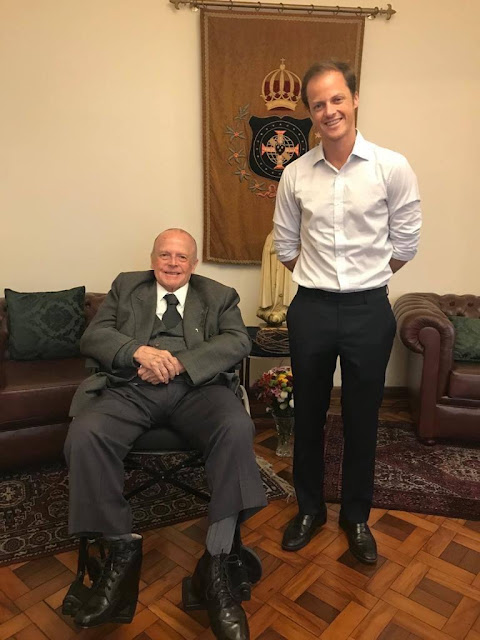 |
| Imágenes del Príncipe Luiz a lo largo de su vida.
Foto (c) Pró Monarquia. |
Hoy, 15 de julio de 2022, en São Paulo, falleció el príncipe Luis de Orleans-Bragança, tras un mes de internación. Tenía ochenta y cuatro años. El príncipe fue jefe de la Casa Imperial de Brasil durante cuarenta y un años.
 |
| La boda del príncipe Pedro Henrique de Brasil y la princesa María Isabel de Baviera |
 |
| Un bebé príncipe Luiz. |
 |
| Cuatro generaciones: La condesa de Caserta sosteniendo en sus brazos a su bisnieto, el príncipe Luiz, a su hija, la princesa María Pía, y a su nieto, el príncipe Pedro Henrique. |
 |
| Pedro Henrique y Maria Elisabeth con sus tres hijos mayores: Luiz (1938-2022), Eudes (1939-2020) y Bertrand (n. 1941). |
El Príncipe Luiz Gastão Maria José Pio de Orleans-Bragança nació el 6 de junio de 1938 en Mandelieu, Francia. Luiz fue el primer hijo y primogénito del Príncipe Pedro Henrique de Brasil (1909-1981) y la Princesa María Isabel de Baviera (1914-2011), quienes se casaron en 1937. Nacido durante el exilio de la Familia Imperial, el Príncipe Luiz fue registrado en el Consulado General de Brasil en París como ciudadano brasileño, cumpliendo el mandato de la Constitución Imperial, garantizando así sus derechos al Trono y a la Corona de Brasil. Los padrinos del Príncipe Luiz fueron su tío, el Príncipe Ludwig de Baviera (1913-2008), y su abuela paterna, la Princesa Imperial Viuda María Pía de Brasil (nacida Princesa de las Dos Sicilias; 1878-1973).
 |
| La princesa María y el príncipe Pedro Henrique con sus hijos, 1962.
Fotografía (c) Casa Imperial do Brasil. |
Con el fin de la Segunda Guerra Mundial, en mayo de 1945, la Familia Imperial brasileña pudo regresar a su patria. Vivió en Río de Janeiro y Petrópolis hasta que, en 1951, se trasladó al norte del Estado de Paraná, entonces gran frontera agrícola de Brasil, donde vivió en la Hacienda São José, en Jacarezinho, y, a partir de 1957, en la Hacienda Santa Maria, en Jundiaí do Sul.
 |
| El príncipe Luiz y su padre, el príncipe Pedro Henrique, en la década de 1960. |
Prince Luiz studied at the Colégio Coração Eucarístico and Santo Inácio, in Rio de Janeiro, and at Colégio Cristo Rei, in Jacarezinho. The prince then went to Europe, where he studied Political and Social Sciences at the University of Paris and Chemistry and Physics at the University of Munich. Luiz graduated with a degree in chemical engineering. He returned to Brazil in 1967, settling in São Paulo and taking over the direction of his father’s Secretariat, which at that time was located at Sítio Santa Maria, in Vassouras.
 |
| Prince Pedro Luiz, Princess Amelia, Prince Antonio, the Duchess of Braganza, Prince Luiz, Princess Cristina, the Duke of Braganza, and Prince Bertrand, 2000. |
 |
| Prince Luiz with Archduchess Christiana of Austria and Prince Alexander of Saxony, Margrave of Meißen, who is married to Luiz’s first cousin Princess Gisela of Bavaria. |
Prince Luiz was a first cousin of Archduke Leopold Franz of Austria, Head of the Grand Ducal House of Tuscany, and of Princess Gisela of Bavaria, Margravine of Meißen and wife of Prince Alexander, Head of the Royal House of Saxony.
 |
| Prince Pedro Henrique and Princess Maria Elisabeth. |
 |
| Prince Luiz and Princess Maria Elisabeth. |
Aged seventy-one, Prince Pedro Henrique of Orleans-Bragança died on 5 July 1981. Prince Luiz, his eldest son and dynastic heir, then became Head of the Imperial House. On 13 May 2011, Princess Maria Elisabeth, aged ninety-six, died. Prince Luiz, who never married, was always strongly attached to the memory of his parents.
 |
| Prince Luiz and his nephew Prince Rafael. |
One of the prince’s hobbies was reading, especially on historical and sociological subjects, in addition to staying up-to-date on everything relevant happening in Brazil and around the world. In his youth, Luiz practiced riding and hunting. In later years, he resumed his passion for photography, revealing himself to be heir to the artistic vein of both sides of his family. Prince Luiz was particularly fond of classical music, with a special predilection for the works of Brazilian composers of the Baroque school.
May the Prince Rest in Peace.



















No comments:
Post a Comment